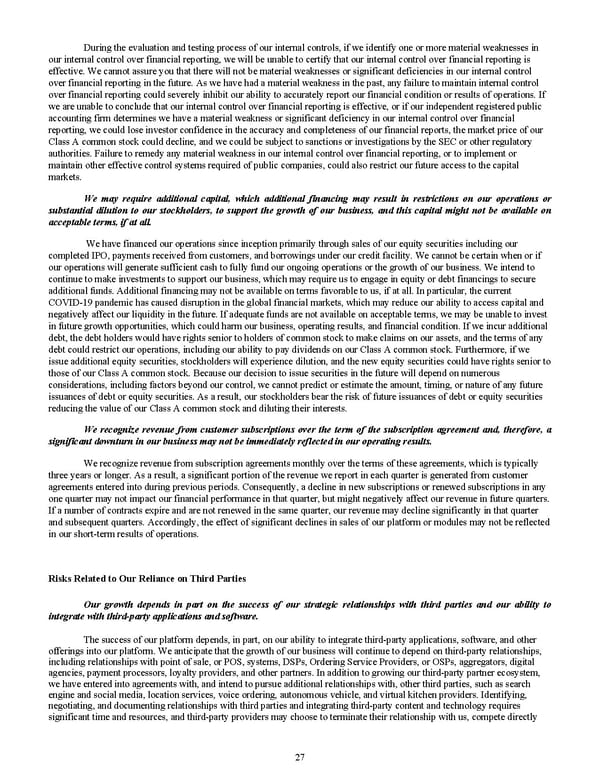During the evaluation and testing process of our internal controls, if we identify one or more material weaknesses in our internal control over financial reporting, we will be unable to certify that our internal control over financial reporting is effective. We cannot assure you that there will not be material weaknesses or significant deficiencies in our internal control over financial reporting in the future. As we have had a material weakness in the past, any failure to maintain internal control over financial reporting could severely inhibit our ability to accurately report our financial condition or results of operations. If we are unable to conclude that our internal control over financial reporting is effective, or if our independent registered public accounting firm determines we have a material weakness or significant deficiency in our internal control over financial reporting, we could lose investor confidence in the accuracy and completeness of our financial reports, the market price of our Class A common stock could decline, and we could be subject to sanctions or investigations by the SEC or other regulatory authorities. Failure to remedy any material weakness in our internal control over financial reporting, or to implement or maintain other effective control systems required of public companies, could also restrict our future access to the capital markets. We may require additional capital, which additional financing may result in restrictions on our operations or substantial dilution to our stockholders, to support the growth of our business, and this capital might not be available on acceptable terms, if at all. We have financed our operations since inception primarily through sales of our equity securities including our completed IPO, payments received from customers, and borrowings under our credit facility. We cannot be certain when or if our operations will generate sufficient cash to fully fund our ongoing operations or the growth of our business. We intend to continue to make investments to support our business, which may require us to engage in equity or debt financings to secure additional funds. Additional financing may not be available on terms favorable to us, if at all. In particular, the current COVID-19 pandemic has caused disruption in the global financial markets, which may reduce our ability to access capital and negatively affect our liquidity in the future. If adequate funds are not available on acceptable terms, we may be unable to invest in future growth opportunities, which could harm our business, operating results, and financial condition. If we incur additional debt, the debt holders would have rights senior to holders of common stock to make claims on our assets, and the terms of any debt could restrict our operations, including our ability to pay dividends on our Class A common stock. Furthermore, if we issue additional equity securities, stockholders will experience dilution, and the new equity securities could have rights senior to those of our Class A common stock. Because our decision to issue securities in the future will depend on numerous considerations, including factors beyond our control, we cannot predict or estimate the amount, timing, or nature of any future issuances of debt or equity securities. As a result, our stockholders bear the risk of future issuances of debt or equity securities reducing the value of our Class A common stock and diluting their interests. We recognize revenue from customer subscriptions over the term of the subscription agreement and, therefore, a significant downturn in our business may not be immediately reflected in our operating results. We recognize revenue from subscription agreements monthly over the terms of these agreements, which is typically three years or longer. As a result, a significant portion of the revenue we report in each quarter is generated from customer agreements entered into during previous periods. Consequently, a decline in new subscriptions or renewed subscriptions in any one quarter may not impact our financial performance in that quarter, but might negatively affect our revenue in future quarters. If a number of contracts expire and are not renewed in the same quarter, our revenue may decline significantly in that quarter and subsequent quarters. Accordingly, the effect of significant declines in sales of our platform or modules may not be reflected in our short-term results of operations. Risks Related to Our Reliance on Third Parties Our growth depends in part on the success of our strategic relationships with third parties and our ability to integrate with third-party applications and software. The success of our platform depends, in part, on our ability to integrate third-party applications, software, and other offerings into our platform. We anticipate that the growth of our business will continue to depend on third-party relationships, including relationships with point of sale, or POS, systems, DSPs, Ordering Service Providers, or OSPs, aggregators, digital agencies, payment processors, loyalty providers, and other partners. In addition to growing our third-party partner ecosystem, we have entered into agreements with, and intend to pursue additional relationships with, other third parties, such as search engine and social media, location services, voice ordering, autonomous vehicle, and virtual kitchen providers. Identifying, negotiating, and documenting relationships with third parties and integrating third-party content and technology requires significant time and resources, and third-party providers may choose to terminate their relationship with us, compete directly 27
 2022 10K Page 33 Page 35
2022 10K Page 33 Page 35